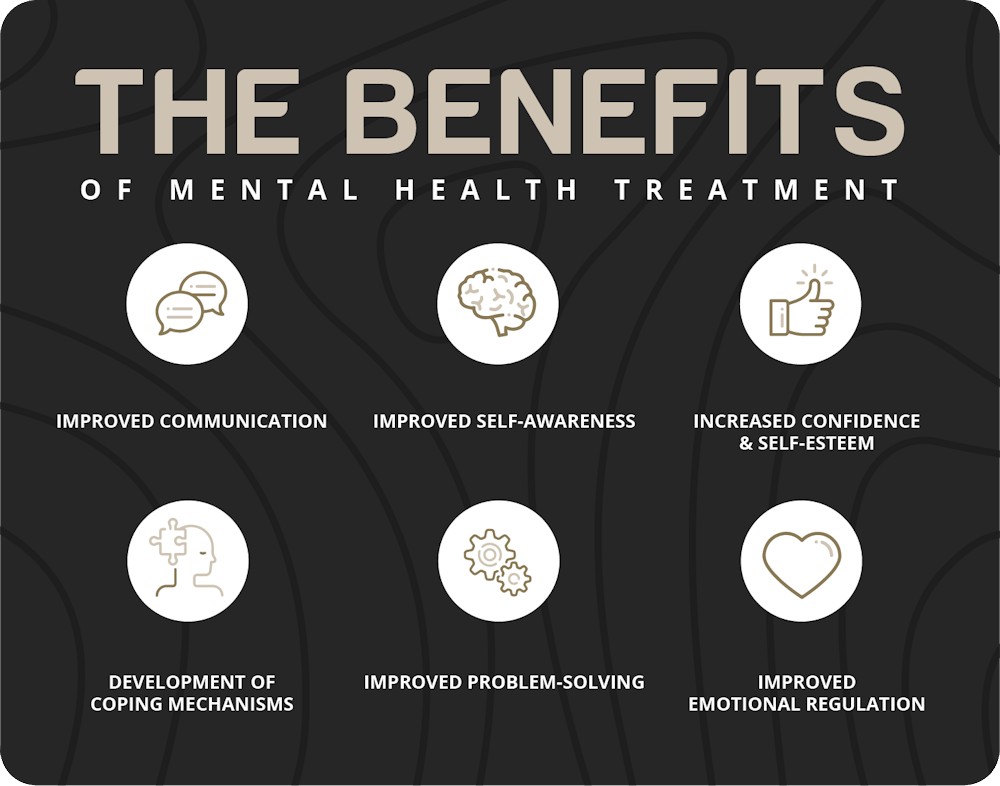The Best Strategy To Use For Mental Health Counseling
Table of ContentsThe 3-Minute Rule for Mental Health CounselingThe 15-Second Trick For Mental Health CounselingSome Known Facts About Mental Health Counseling.Mental Health Counseling Things To Know Before You Get ThisUnknown Facts About Mental Health Counseling
Via treatment, you can obtain understanding right into your own patterns of behavior and communication, which can result in more fulfilling and pleasing partnerships with friends, family, and enchanting companions. What we believe, we materialize. If you're taken in with negative emotions and adverse ideas that are conflicting with your life, therapy can help., or there are other adverse methods you act. Treatment can help you modify those habits that are having a negative influence on your world and partnerships.

The value of therapy goes past your mental wellness. Getting treatment to attend to certain elements of your life can help you be a lot more efficient in various other areas, consisting of work. Some research study has even revealed that there's a direct relationship between looking for mental health and wellness aid and a decrease in missed out on work.

The Basic Principles Of Mental Health Counseling
You can see a therapist when things are going truly well in your life, or when you will experience a huge life transition." Talkspace therapist Kate Rosenblatt, MA, LPC, LMHC. There are also extra advantages of treatment than simply the ones we have actually reviewed. Treatment can show you just how to manage separation, take care of pain, or construct partnerships (enchanting or those with friend or family) in a healthy means.
For the objective of the here and now research study, viewed benefits and barriers to mental wellness help-seeking are being discovered. Previous research study found that perceived obstacles have a substantial impact on university students' health actions options (Von Ah, Ebert, Ngamvitroj, Park & Kang, 2003). Perceived advantages and obstacles to help-seeking were particularly selected as a result of their impact on decision-making and eventually action (Glanz, Rimer, & Su, 2005).
Today research seeks to analyze whether preconception acts as a barrier to therapy among college pupils. Eisenberg et al. (2011) suggested that apprehension about treatment efficiency is an additional barrier to taking part in treatment. Research findings exposed that university student backed numerous barriers to joining treatment. Mental Health Counseling. Among these were: (1) preferring to deal with psychological wellness problems themselves, (2) not having sufficient time to participate in treatment, (3) inquiries about whether psychological wellness treatment is reliable in remediating issues, (4) an idea that stress is typical or the trouble will improve without treatment, (5) lack of cash, and (6) stress about what others would assume if they discovered therapy engagement.
(2006) reported similar variables as barriers to seeking therapy and additionally discovered that a mistrust of service providers may impede students from seeking help. Staff in university psychological wellness facilities might be viewed as unfriendly, and long wait times for services may be "off-putting" for students. Factors helping with much more favorable perspectives are commonly at the opposite pole of those variables determined as barriers.
Mental Health Counseling for Dummies
One in 3 (34.6%) reported residing on school and one in 4 (23.3%) reported coping with moms and dads. Nearly fifty percent of pupils were involved in campus companies and 1 in 10 reported remaining in a society or sorority. Even more than one-third of students (38.1%) reported that they had a relative or close friend with an identified mental health and wellness problem.

Mental Health Counseling Can Be Fun For Anyone
Univariate F-tests identified specific subscale items that substantially varied. Ladies were much less most likely than men to perceive individuals who go to counseling as mentally weak, individuals who most likely to counseling as crazy, to really feel that people with mental health problems should handle troubles by themselves, that people who go to therapy as unable to resolve problems, that individuals that most likely to counseling slouch, and to really feel that people who go to therapy are various from typical people in an adverse means.
Study results exposed that females were substantially less likely than men to hold stigma-related mindsets. This follows previous research which additionally found that males hold higher degrees of viewed stigma than ladies (Chandra & Minkovitz, 2006). Based upon research study searchings for, it is noticeable that males may be less most likely than women to look for treatment because of low regarded barriers in addition to high stigma-related mindsets.
The Ultimate Guide To Mental Health Counseling
Additionally, college wellness experts might supply instructional programs targeting men with information on the benefits of psychological health and wellness therapy and the importance of looking for aid when why not try here needed. All approaches must be examined with future research to identify the effect on college pupils, especially males. Unlike basic populace researches which disclose that females are more probable to seek mental wellness solutions contrasted to men (Haunstein et al., 2006; Mackenzie, Gekoski, & Knox, 2006), today study located no substantial distinctions in the number of regarded obstacles to help-seeking habits based upon sex.
Researchers guess that this is primarily as a result of conventional social standards and sex roles that identified males based on stamina and lack of psychological expression (Addis & Mahalik, 2003; Ang, Lim, description Tan, & Yau, 2004; Mojtabai, 2007). In general, there have actually been blended outcomes among the university student population pertaining to sex differences (Rosenthal & Wilson, 2008). This searching for was unforeseen and can highlight that those who had actually gotten counseling had a much better idea of wait times and other "gain access to" obstacles that may make it hard to start treatment. Maybe, participants who have obtained therapy view a lot more barriers than individuals who have actually not received counseling given that seeking therapy services once again can involve fear of self-disclosing personal information to a new therapist.